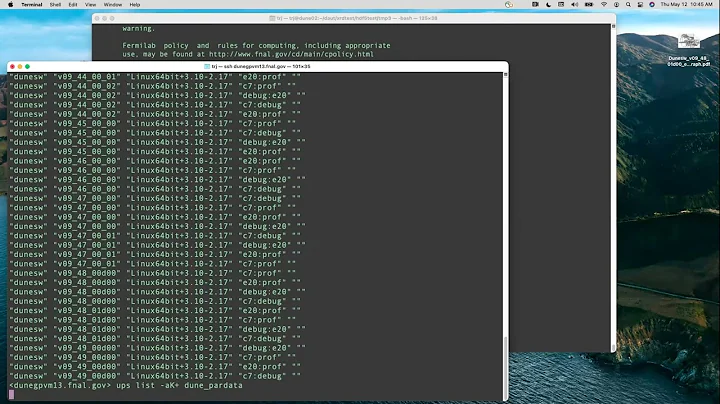boost log to print source code file name and line number
Solution 1
I would suggest to use the boost::log::add_value() function.
Define:
#define LOG_LOCATION(LEVEL, MSG) \
BOOST_LOG_SEV(logger::get(), LEVEL) \
<< boost::log::add_value("Line", __LINE__) \
<< boost::log::add_value("File", __FILE__) \
<< boost::log::add_value("Function", __FUNCTION__) << MSG
And then you can format it as follows:
boost::log::add_common_attributes();
boost::log::register_simple_filter_factory<boost::log::trivial::severity_level, char>("Severity");
boost::log::register_simple_formatter_factory<boost::log::trivial::severity_level, char>("Severity");
auto syslog_format(
boost::log::expressions::stream <<
"[" << boost::log::expressions::format_date_time< boost::posix_time::ptime >("TimeStamp", "%Y-%m-%d %H:%M:%S") <<
"] [" << boost::log::expressions::attr<boost::log::attributes::current_thread_id::value_type>("ThreadID") <<
"] [" << std::left << std::setw(7) << std::setfill(' ') << boost::log::trivial::severity <<
"] " << boost::log::expressions::smessage <<
" (" << boost::log::expressions::attr<std::string>("Filename") <<
":" << boost::log::expressions::attr<int>("Line") <<
":" << boost::log::expressions::attr<std::string>("Function") <<
")"
);
boost::log::add_file_log(
boost::log::keywords::file_name = "sys_%d_%m_%Y.%N.log",
boost::log::keywords::format = syslog_format
);
No need to add global attributes, and you can format it easily as seen above. I find this is a good compromise between other's solutions and the raw __FILE__ __LINE__ approach.
Full example here.
Solution 2
As Horus pointed out, you can use attributes to log file and line numbers. However it is best to avoid using multi-statements macros to avoid problems with expressions like this:
if (something)
LOG_FILE_LINE(debug) << "It's true"; // Only the first statement is conditional!
You can do better creating a macro that leverages the underlying behavior of the Boost Log library. For example, BOOST_LOG_SEV is:
#define BOOST_LOG_SEV(logger, lvl) BOOST_LOG_STREAM_SEV(logger, lvl)
#define BOOST_LOG_STREAM_SEV(logger, lvl)\
BOOST_LOG_STREAM_WITH_PARAMS((logger), (::boost::log::keywords::severity = (lvl)))
Using BOOST_LOG_STREAM_WITH_PARAMS you can set and get more attributes, like this:
// New macro that includes severity, filename and line number
#define CUSTOM_LOG(logger, sev) \
BOOST_LOG_STREAM_WITH_PARAMS( \
(logger), \
(set_get_attrib("File", path_to_filename(__FILE__))) \
(set_get_attrib("Line", __LINE__)) \
(::boost::log::keywords::severity = (boost::log::trivial::sev)) \
)
// Set attribute and return the new value
template<typename ValueType>
ValueType set_get_attrib(const char* name, ValueType value) {
auto attr = logging::attribute_cast<attrs::mutable_constant<ValueType>>(logging::core::get()->get_thread_attributes()[name]);
attr.set(value);
return attr.get();
}
// Convert file path to only the filename
std::string path_to_filename(std::string path) {
return path.substr(path.find_last_of("/\\")+1);
}
The complete source code is:
#include <boost/log/trivial.hpp>
#include <boost/log/sources/severity_logger.hpp>
#include <boost/log/utility/setup/file.hpp>
#include <boost/log/utility/setup/console.hpp>
#include <boost/log/expressions.hpp>
#include <boost/log/utility/setup/common_attributes.hpp>
#include <boost/log/attributes/mutable_constant.hpp>
#include <boost/date_time/posix_time/posix_time_types.hpp>
#include <boost/log/support/date_time.hpp>
#include <boost/log/attributes/mutable_constant.hpp>
namespace logging = boost::log;
namespace attrs = boost::log::attributes;
namespace expr = boost::log::expressions;
namespace src = boost::log::sources;
namespace keywords = boost::log::keywords;
// New macro that includes severity, filename and line number
#define CUSTOM_LOG(logger, sev) \
BOOST_LOG_STREAM_WITH_PARAMS( \
(logger), \
(set_get_attrib("File", path_to_filename(__FILE__))) \
(set_get_attrib("Line", __LINE__)) \
(::boost::log::keywords::severity = (boost::log::trivial::sev)) \
)
// Set attribute and return the new value
template<typename ValueType>
ValueType set_get_attrib(const char* name, ValueType value) {
auto attr = logging::attribute_cast<attrs::mutable_constant<ValueType>>(logging::core::get()->get_thread_attributes()[name]);
attr.set(value);
return attr.get();
}
// Convert file path to only the filename
std::string path_to_filename(std::string path) {
return path.substr(path.find_last_of("/\\")+1);
}
void init() {
// New attributes that hold filename and line number
logging::core::get()->add_thread_attribute("File", attrs::mutable_constant<std::string>(""));
logging::core::get()->add_thread_attribute("Line", attrs::mutable_constant<int>(0));
logging::add_file_log (
keywords::file_name = "sample.log",
keywords::format = (
expr::stream
<< expr::format_date_time<boost::posix_time::ptime>("TimeStamp", "%Y-%m-%d_%H:%M:%S.%f")
<< ": <" << boost::log::trivial::severity << "> "
<< '[' << expr::attr<std::string>("File")
<< ':' << expr::attr<int>("Line") << "] "
<< expr::smessage
)
);
logging::add_common_attributes();
}
int main(int argc, char* argv[]) {
init();
src::severity_logger<logging::trivial::severity_level> lg;
CUSTOM_LOG(lg, debug) << "A regular message";
return 0;
}
This generate a log like this:
2015-10-15_15:25:12.743153: <debug> [main.cpp:61] A regular message
Solution 3
As user2943014 pointed out, using scopes prints the line number where you opened that scope, not the line number where you emitted a log message using BOOST_LOG_SEV.
You can use attributes to log the line numbers etc at the place you actually logged.
Register global attributes in your logging initialization function:
using namespace boost::log;
core::get()->add_global_attribute("Line", attributes::mutable_constant<int>(5));
core::get()->add_global_attribute("File", attributes::mutable_constant<std::string>(""));
core::get()->add_global_attribute("Function", attributes::mutable_constant<std::string>(""));
Setting these attributes in your logging macro:
#define logInfo(methodname, message) \
LOG_LOCATION; \
BOOST_LOG_SEV(_log, boost::log::trivial::severity_level::trace) << message
#define LOG_LOCATION \
boost::log::attribute_cast<boost::log::attributes::mutable_constant<int>>(boost::log::core::get()->get_global_attributes()["Line"]).set(__LINE__); \
boost::log::attribute_cast<boost::log::attributes::mutable_constant<std::string>>(boost::log::core::get()->get_global_attributes()["File"]).set(__FILE__); \
boost::log::attribute_cast<boost::log::attributes::mutable_constant<std::string>>(boost::log::core::get()->get_global_attributes()["Function"]).set(__func__);
Not exactly beautiful, but it works and it was a long way for me. It's a pity boost doesn't offer this feature out of the box.
Solution 4
Define
namespace attrs = boost::logging::attributes;
namespace expr = boost::logging::expressions;
Add
<< expr::format_named_scope("Scope", keywords::format = "[%f:%l]")
to your keywords::format = (...) in init.
Then add
logging::core::get()->add_global_attribute("Scope", attrs::named_scope());
after add_common_attributes() in main.
Then just before the BOOST_LOG_SEV line add BOOST_LOG_NAMED_SCOPE("whatever").
BOOST_LOG_NAMED_SCOPE("whatever") creates a "scope" named "whatever". The scope is implemented by a unused variable that contains the scope name and the file and the line where the scope was defined.
The format_named_scope line specifies how a scope should be formatted in the log line. %f is the file, %l is the line and %n is the scope name.
Note that the file line that appears in the log record is the line where the macro BOOST_LOG_NAMED_SCOPE appears and not the line of the BOOST_LOG_SEV macro.
I am not aware of simple method to record the file and line without using the BOOST_LOG_NAMED_SCOPE.
Related videos on Youtube
Pritesh Acharya
I am involved in writing distributed application using ZMQ
Updated on July 22, 2022Comments
-
Pritesh Acharya almost 2 years
I'm using Boost(1.55.0) Logging in my C++ application. I have been able to generate log of this format
[2014-Jul-15 10:47:26.137959]: <debug> A regular messageI want to be able to add source file name and line number where the log is generated.
[2014-Jul-15 10:47:26.137959]: <debug> [filename:line_no] A regular messageexample:
[2014-Jul-15 10:47:26.137959]: <debug> [helloworld.cpp : 12] A regular messageSource Code:
#include <boost/log/core.hpp> #include <boost/log/trivial.hpp> #include <boost/log/expressions.hpp> #include <boost/log/sinks/text_file_backend.hpp> #include <boost/log/utility/setup/file.hpp> #include <boost/log/utility/setup/common_attributes.hpp> #include <boost/log/sources/severity_logger.hpp> #include <boost/log/sources/record_ostream.hpp> #include <boost/log/expressions.hpp> #include <boost/log/support/date_time.hpp> #include <boost/log/attributes/attribute.hpp> #include <boost/log/attributes/attribute_cast.hpp> #include <boost/log/attributes/attribute_value.hpp> #include <boost/make_shared.hpp> #include <boost/property_tree/ptree.hpp> namespace logging = boost::log; namespace src = boost::log::sources; namespace sinks = boost::log::sinks; namespace keywords = boost::log::keywords; void init() { logging::add_file_log ( keywords::file_name = "sample_%N.log", /*< file name pattern >*/ keywords::rotation_size = 10*1024*1204, /*< rotate files every 10 MiB... >*/ keywords::time_based_rotation = sinks::file::rotation_at_time_point(0, 0, 0), /*< ...or at midnight >*/ keywords::format = ( boost::log::expressions::stream << boost::log::expressions::format_date_time< boost::posix_time::ptime >("TimeStamp", "%Y-%m-%d_%H:%M:%S.%f") << ": <" << boost::log::trivial::severity << "> " << boost::log::expressions::smessage ) ); } int main(int, char*[]) { init(); logging::add_common_attributes(); using namespace logging::trivial; src::severity_logger< severity_level > lg; BOOST_LOG_SEV(lg, debug) << "A regular message"; return 0; }-
graywolf about 7 yearsPossible duplicate of Boost.Log: Support file name and line number
-
Jason Harrison over 5 years
-
-
Pritesh Acharya over 8 yearsLooks nice to me. Will try this somtime
-
bobah over 7 years+1. Looking at how it's implemented - it should work faster if you define attribute type as
mutable_constant<boost::log::string_literal>and assign it withboost::log::string_literal(__FILE__)etc., as it will stop allocating / copying strings on each log line. -
Guillermo Ruiz over 7 yearsGood point. However,
__LINE__is an integer constant and__FILE__is used to get a substring in this sample.boost::log::string_literalconstructs from an array constant likechar value[N]. -
Guillermo Ruiz over 7 years@Nature.Li has indicated that the code was not thread safe. I changed the global attributes for thread attributes in the code, but I have not tested with several threads.
-
unnamed over 7 years@GuillermoRuiz Hi. Could you share the thread safe code? I've also some issues with threads.
-
Pranav over 7 yearsDoes it work in multi-threaded code? I'm getting inconsistent line numbers with this solution
-
jean over 7 yearsThe thread issue is no relate to add_thread_attribute or add_global_attribute due to this action is an init action, so it generally called in main thread. call add_thread_attribute in init is problematic, that means this attribute only available for main thread. If you want to make this work concurrently, manual add lock to protect "logging::core::get()->get_global_attributes()", it return attribute_set object which belong to logging core which can not be shared by multi thread without an lock
-
graywolf about 7 yearsstackoverflow.com/a/31160870/781743 provides nicer and imho thread-safe solution
-
bevis over 4 yearsI know this is an old thread, but for those coming here from a search, I found (like others) that Guillermo Ruiz solution was not thread safe, but this one does seem to be (using logger_mt etc) , and seems to be much more straightforward.












![C# - How To Populate ComboBox With Files Name In C# [ With Source Code ]](https://i.ytimg.com/vi/JvPEX_cl-YU/hq720.jpg?sqp=-oaymwEcCNAFEJQDSFXyq4qpAw4IARUAAIhCGAFwAcABBg==&rs=AOn4CLDPIN5Z7rU3gEPKt33udoNN1d3SXA)


